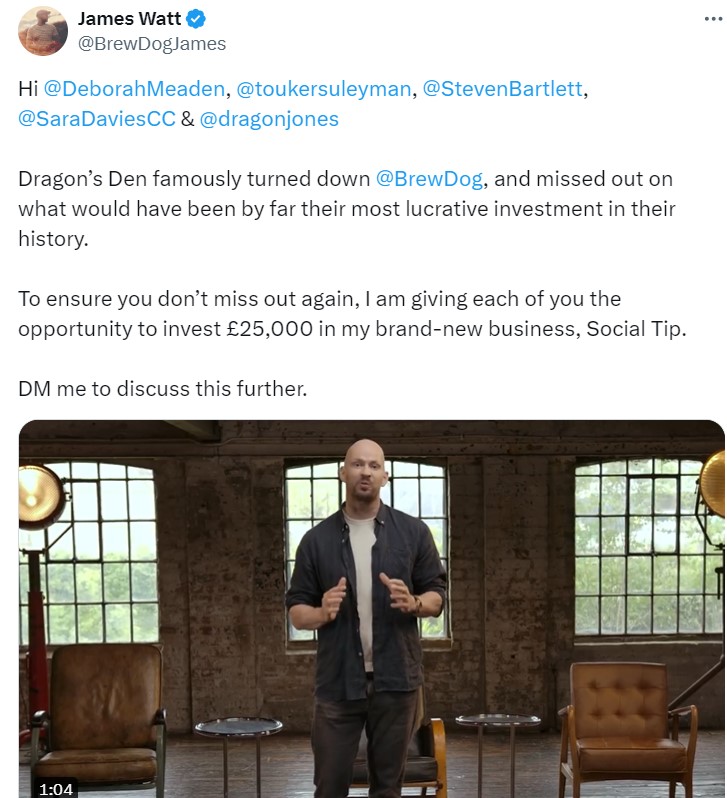James Watt is the co-founder and former CEO of the BrewDog craft beer company. From the outset, he stressed he would not rely on advertising in the manner of established “boring” beer and lager brands, and set out to crowdsource media coverage through a series of controversial and disruptive stunts. This even included driving an army tank through the streets of London to influence higher product sales and project a uniquely rebellious market position. James Watt was always a exponent of crowdsourcing marketing, and he has now fully entered the arena of influencer marketing with a startup he has called Social Tip. He has also been an enthusiastic advocate of crowdfunding startups, and so it is with little surprise that he turned to crowdfunding to not only finance early stage growth of his own startup Social Tip, but also to build a community of early investors and adopters.

Handing out BrewDog craft beer to a crowd from an army tank in London, UK, was a way of crowdsourcing marketing exposure for their new bar in the Camden district.
Social Tip is a new app platform which is designed to allow a brand’s normal consumers to become influencers and be rewarded for contributing to overall word-of-mouth activities, amplified for the digital age and scalable through innovative technology. Brands including Huel, PureGym and the Slug & Lettuce pub chain are already among its clients.
Influencer marketing has steadily become more important for brand owners as conventional ways and methods of marketing have become less effective. However, marketing-savvy consumers are aware that the biggest influencers earn big bucks from their support of brands that they may have only a passing acquaintance with.
In the United States, the Because I Love It platform (BILI) already allows brand owners to connect with more credible though lesser-known influencers, and the influencers can choose to work with brands that they really do use, like and are happy to promote. In return they earn a fair share of each sale, and the brands are perceived to be more authentic. We spoke with Wendy Bairos, Head of Communications at BILI, in September 2023.
Social Tip is now taking influencer marketing to a more granular level by empowering everyday customers to be rewarded for their efforts through their personal social media networks. It is a great example of crowdsourcing brand marketing.
Crowdfunding his influencer marketing startup
James Watt knows equity crowdfunding inside out. Up to 2021, during more than a decade of BrewDog’s growth, over 180,000 retail investors had put more than £80 million in to crowdfunding the startup business, and also been regular drinkers and advocates of its products.
He also launched an investment challenge in 2023 called “The Next Unicorn” in partnership with the UK equity crowdfunding platform Crowdcube. James Watt searched for startups with unicorn potential in which he would invest up to a total of £5 million of his personal wealth. Retail investors would be able to invest alongside him through Crowdcube. A final list of five startups were invited to pitch in Las Vegas.
When it came to offering equity in Social Tip through crowdfunding he knew all the strategies to succeed at multiple levels.
- The funding was led by award winning B2B SaaS investor Haatch.
- He assembled a great management team, including CTO Thomas Matecki who had previously scaled fintech unicorn Zilch from zero to a $2 billion valuation in 14 months.
- Good marketing is vital when crowdfunding startups. For example, he messaged the investors in the UK tv show Dragon’s Den (equivalent to the U.S. Shark Tank) via social media, with an offer to invest £25,000 each. This post on X/Twitter alone achieved 49,000 audience impressions. This is a good example of crowdsourcing marketing exposure through earning it rather than paying for it.
- Perks for investing in this influencer marketing platform included anyone with two or more shares being invited to an AGM that will be “an epic party.”
- A highly effective private round of crowdfunding before going fully public enabled Social Tip to announce it had more than doubled its initial £1m target in little over a day of being in the public domain. It closed to further investments just one day later.
The equity crowdfunding round was very soon closed at a total raise of £2,544,966 from 1,338 investors. This accounted for 16.37% equity. With such high demand for equity in the business, maybe he’s keeping hold of the remaining shares to return for a second round with a higher company valuation?





0 Comments